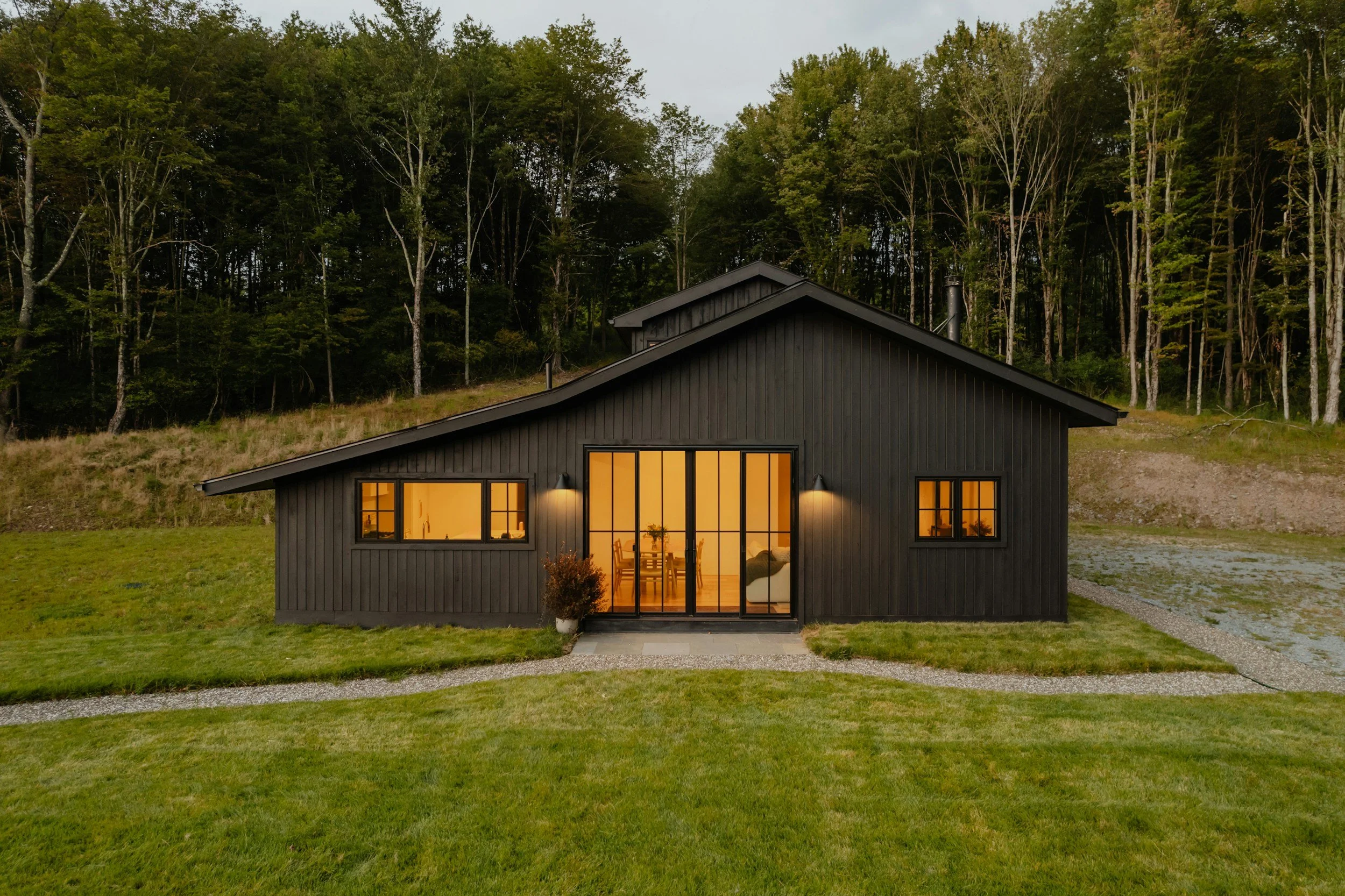Should You Buy an Asheville Vacation Home Before the End of the Year?
Should You Buy an Asheville Vacation Home Before the End of the Year?
It’s mid-October in Asheville, and the mountains are putting on their annual show — fiery reds, warm golds, and crisp blue skies. The fall tourism rush is in full swing, but if you’ve been thinking about buying a vacation home here, you might be wondering:
Is there still time to make it happen before the calendar flips to 2026?
The short answer: Yes, and there are some strategic advantages to moving before year’s end. Whether you’re dreaming of a personal retreat or a short-term rental investment, the final months of the year can be a surprisingly smart time to buy in Asheville — if you know what to expect.
Why Asheville Vacation Homes Stay in Demand Year-Round
Before we get into timing, let’s remember why Asheville vacation properties hold their value:
Four-Season Destination – Leaf season in the fall, winter ski trips nearby, spring blooms, and summer hiking keep visitors coming 12 months a year.
Culture + Outdoors Combo – Asheville offers award-winning food, breweries, music, and art alongside access to the Blue Ridge Parkway, Pisgah National Forest, and endless hiking trails.
Short-Term Rental Potential – While regulated within city limits, permitted vacation rentals in surrounding areas can bring in strong nightly rates during peak seasons.
This year-round appeal means demand doesn’t disappear when the leaves fall — it simply shifts.
The Strategic Case for Buying in Q4 2025
As we head into the last quarter of the year, here’s why you might want to make your move now:
1. Less Competition Than Spring Market
Spring still brings the biggest wave of Asheville buyers. Shopping in the fall means fewer multiple-offer situations and more room for negotiation, especially with sellers motivated to close before year-end. You’ll have breathing room to really evaluate properties without the pressure-cooker atmosphere of peak season.
2. Significant Tax Reduction Opportunities for 2025
This is where closing before December 31st can really pay off financially. The tax benefits of purchasing a vacation home in Q4 can result in substantial savings on your 2025 tax return:
For Personal Use Vacation Homes:
Mortgage Interest Deduction: You can deduct mortgage interest on your vacation home just like your primary residence, up to $750,000 in mortgage debt (for married filing jointly). If you close in November, you’ll get 1-2 months of deductible interest in 2025.
Property Tax Deduction: State and local property taxes are deductible up to $10,000 total (including your primary home). Even partial-year property taxes from your closing can contribute to this deduction.
Points and Closing Costs: If you paid points to reduce your interest rate, these are typically deductible in the year you close. Some closing costs may also qualify for deductions.
For Vacation Rental Properties (The Big Winners):
Accelerated Depreciation: Rental properties can be depreciated over 27.5 years, but closing in 2025 means you can claim partial-year depreciation on your 2025 return. On a $400,000 property, that could mean $3,000-6,000 in additional deductions.
Immediate Expense Deductions: All your setup costs for rental readiness can potentially be deducted in 2025:
Furniture and furnishings (up to certain limits)
Marketing and photography costs
Cleaning and maintenance supplies
Property management setup fees
Professional consultation fees
Section 199A Deduction: Vacation rental income may qualify for the 20% qualified business income deduction, reducing your effective tax rate on rental profits.
Startup Cost Deductions: You can deduct up to $5,000 in business startup costs in your first year, with remaining costs amortized over 15 years.
Real-World Tax Savings Example:
Let’s say you buy a $450,000 Asheville vacation home in November 2025 that you plan to rent out:
Mortgage interest (2 months): ~$2,400 deduction
Property taxes (prorated): ~$1,200 deduction
Depreciation (partial year): ~$4,500 deduction
Furnishing and setup costs: ~$8,000 deduction
Professional services: ~$1,500 deduction
Total potential 2025 deductions: ~$17,600
At a 24% tax bracket, this could save you over $4,200 in taxes for 2025 alone.
Important: Always consult with a tax professional familiar with vacation rental properties. Tax laws are complex, and your specific situation will determine which deductions apply. Some benefits phase out at higher income levels, and there are important distinctions between personal use and rental use that affect available deductions.
3. Motivated Sellers Create Opportunities
Some vacation home owners prefer not to carry their property into the new year. They might offer better pricing, cover closing costs, or provide favorable terms to buyers who can close quickly. This motivation often translates into real savings and smoother negotiations.
4. Get Ready for 2026’s Peak Rental Season
Closing this fall gives you the winter months to furnish, decorate, and market your property so you can hit the ground running for Asheville’s lucrative spring and summer rental season. Properties that launch in March and April often capture the highest occupancy rates and premium pricing for the entire year.
5. Lock In Current Interest Rates
Interest rates in late 2025 are steady but could shift in 2026. If you can secure a good rate now, you’ll protect your long-term investment costs and monthly payments. Even a small rate increase can significantly impact your purchasing power and return on investment.
What’s Happening in the Asheville Market Right Now
Pricing: Home prices remain steady compared to mid-year, with some strategic softening in properties that have been on the market since summer. This creates opportunities for informed buyers to negotiate.
Inventory: Slightly higher than the spring peak, giving buyers more choice without oversupply. You’ll find quality options without the scarcity pressure of peak season.
Buyer Activity: Out-of-town buyers continue to make up a significant portion of offers, especially for properties with mountain views or close proximity to downtown Asheville’s cultural attractions.
Market Sentiment: The frenzy of early 2020s buying has cooled, but well-located and well-presented vacation homes still move quickly when priced appropriately.
Critical Considerations Before You Buy This Year
Short-Term Rental Regulations: Know Before You Buy
Inside Asheville city limits, vacation rental permits are tightly regulated and extremely limited. Many savvy buyers look to Buncombe County or surrounding areas like Black Mountain, Weaverville, or Fletcher where the rules are less restrictive but still generate strong rental income.
Key Action: Work with an agent who knows the zoning map intimately and can verify a property’s rental eligibility before you fall in love. This due diligence can save you from costly mistakes.
Seasonal Access and Winter Considerations
Some mountain properties feature steep driveways or gravel roads that become challenging in winter weather. If you plan to use your home year-round or rent it out during ski season, consider how accessible it will be in snow or ice conditions.
Smart Strategy: Visit properties during different weather conditions if possible, or ask detailed questions about winter maintenance and access.
Vacation Home Financing Requirements
Lenders treat vacation homes differently than primary residences. Expect larger down payments (often 10–25% minimum) and potentially stricter underwriting, especially for properties you plan to rent. Your debt-to-income ratios and cash reserves will face closer scrutiny.
Pro Tip: Get pre-approved specifically for a vacation home purchase, not just any mortgage. The requirements and rates differ significantly.
Tax Planning Strategy for Your Purchase
Work with a Tax Professional Early: Before you close, consult with a CPA or tax advisor who understands vacation rental properties. They can help you:
Structure your purchase for maximum tax benefits
Decide between personal vs. business entity ownership
Plan your furnishing and setup timeline for optimal deductions
Understand the personal use vs. rental use rules that affect your deductions
Keep Detailed Records: From day one, track every expense related to your property purchase and setup. This includes:
All closing costs and fees
Travel expenses for property visits
Professional consultation fees
Furnishing and decoration costs
Marketing and setup expenses
Consider Timing of Expenses: Some costs are deductible when paid, others when the property is “placed in service” for rental use. Strategic timing can maximize your 2025 deductions.
Furnishing and Setup Investment
If your home will double as a short-term rental, you’ll want it fully furnished, professionally photographed, and listed before the spring rush — which means budgeting for furniture, décor, linens, kitchen supplies, and marketing materials this winter.
Budget Reality: Plan for $15,000–$40,000+ in furnishing costs depending on the size and target guest experience you want to create.
Tax Smart Approach: Many furnishing costs can be deducted as business expenses if you’re renting the property. Work with your tax advisor to understand which items qualify for immediate deduction versus depreciation.
The Guest Experience Factor: Designing for Success
If your goal is to rent your Asheville vacation home when you’re not using it, guest experience isn’t just nice to have — it’s what drives occupancy rates, premium pricing, and positive reviews that keep bookings coming.
Location Strategy
Culture Seekers: Properties walkable to downtown Asheville’s breweries, restaurants, and music venues command higher nightly rates and attract repeat guests.
Outdoor Enthusiasts: Homes near trailheads, the Blue Ridge Parkway, or with mountain views appeal to hikers, cyclists, and nature lovers willing to pay premium prices.
Best of Both: Properties offering easy access to both downtown and outdoor recreation often achieve the highest occupancy rates.
Interior Design That Converts Browsers to Bookers
In Asheville’s crowded vacation rental market, standout interiors are what get clicks, bookings, and five-star reviews. Think beyond basic furniture:
Layer textures with local textiles, cozy throws, and mountain-inspired materials
Create Instagram-worthy spaces with reading nooks, fire pit areas, and scenic viewing spots
Highlight local character through regional art, craft elements, and Blue Ridge aesthetic touches
Invest in comfort with quality mattresses, luxury linens, and thoughtful amenities
Amenities That Drive Premium Rates
Think beyond the basics when planning your guest experience:
High-Impact Additions:
Hot tubs with mountain views
Fire pits for evening gatherings
Game rooms for rainy days
Well-stocked gourmet kitchens
Fast WiFi for remote workers
EV charging stations
Local Touches:
Guidebooks to local trails and attractions
Partnerships with local businesses for guest discounts
Welcome baskets with regional products
Buying in Q4 gives you the winter months to plan and execute a comprehensive design strategy before your first guest arrives.
Your Q4 Closing Action Plan
Get Pre-Approved Now
A strong offer backed by vacation home pre-approval can speed up negotiations and show sellers you’re serious. This is especially important in a market where cash offers aren’t uncommon.
Tour Properties Midweek
You’ll avoid weekend crowds at in-demand properties, especially during peak leaf season. You’ll also get more focused attention from listing agents and can ask detailed questions about the property.
Schedule Inspections Promptly
Service providers — from home inspectors to appraisers — can book up fast this time of year. Build buffer time into your timeline for potential delays. (Your agent can give you recommendations for contractors.
Negotiate Smart Inclusions
Some sellers are willing to include furniture, outdoor equipment, or even existing bookings in the sale — a huge win if you’re aiming to start renting in early 2026. Don’t be afraid to ask what might be available.
Plan Your Setup Timeline with Tax Benefits in Mind
The sooner you close, the sooner you can start prepping for rental season AND maximizing your 2025 tax deductions. Create a realistic timeline for:
Closing and taking possession
Furnishing and decorating (potentially deductible expenses)
Professional photography and marketing setup
Listing creation and booking platform setup
First guest bookings for early 2026
What If You Wait Until 2026?
Waiting isn’t necessarily wrong — it depends on your financial readiness and priorities. If you wait until spring 2026:
Potential Advantages:
More listings typically hit the market in spring
You’ll have more time to save and plan
Market conditions might shift in your favor
Potential Drawbacks:
You’ll face more buyer competition and likely higher prices
You could miss the entire first half of 2026’s peak rental season
Interest rates and market conditions could change unfavorably
You’ll lose all the 2025 tax benefits — a potentially significant financial loss
Prime properties often get snapped up quickly in spring
The Tax Cost of Waiting: Delaying your purchase until 2026 means losing all those 2025 tax deductions we discussed. For many buyers, this alone can justify moving forward this year if they find the right property.
Understanding Asheville’s Unique Investment Landscape
Neighborhood Nuances Matter
Downtown/South Slope: Highest nightly rates but limited rental permit availability
West Asheville: Growing arts district with good rental potential
Black Mountain: Charming small town feel with fewer restrictions
Weaverville: Family-friendly with easy access to outdoor activities
Fairview/Fletcher: More space for your money, popular with families
Seasonal Revenue Patterns
Understanding Asheville’s rental income patterns helps you make smarter buying decisions:
Peak Season (April-October): $200-400+ per night for well-positioned properties
Shoulder Seasons (March, November): $150-250 per night
Winter (December-February): $100-200 per night, but ski season can spike rates
Annual Occupancy: Well-managed properties often achieve 60-75% occupancy rates
Long-Term Market Outlook
Asheville’s vacation rental market benefits from several long-term trends:
Continued growth in domestic travel and “workations”
Asheville’s reputation as a top U.S. destination
Limited developable land maintaining property values
Growing corporate retreat and event business
Making Your Decision: Key Questions to Ask Yourself
Before you commit to a Q4 purchase, honestly evaluate:
Financial Readiness: Do you have adequate down payment, closing costs, and 3-6 months of carrying costs saved?
Tax Strategy: Have you consulted with a tax professional about the benefits of closing in 2025?
Time Commitment: Are you prepared to manage a vacation rental or hire professional management?
Risk Tolerance: Can you handle potential vacancy periods or unexpected maintenance costs?
Usage Goals: Will you use the property personally, or is this purely an investment?
Market Knowledge: Do you understand Asheville’s specific regulations and market dynamics?
Working with the Right Professionals
Success in Asheville’s vacation home market requires a team that understands the unique challenges:
Your Realtor Should:
Know vacation rental regulations inside and out
Understand seasonal market patterns
Have connections with local property managers and contractors
Provide realistic rental income projections
Also Consider:
A CPA or tax advisor experienced with vacation rental properties
A local property management company for rental operations
An interior designer experienced with vacation rentals (oh hay!;)
An attorney for complex transactions or entity formation
Final Takeaway: Timing Meets Opportunity
Buying an Asheville vacation home in Q4 2025 can be a smart strategic move — especially when you factor in the significant tax benefits available for 2025 purchases. The combination of reduced competition, motivated sellers, and substantial tax savings creates a compelling case for acting before year-end.
The key is finding the intersection of your personal goals, financial readiness, market opportunity, and tax strategy. Focus on properties that match both your lifestyle dreams and — if renting — your target guest’s desires for an unforgettable Asheville experience.
Remember: The “perfect” time to buy is when you find the right property, have your finances in order, understand the local market dynamics, AND can maximize your tax benefits. For many buyers, that time is right now.
With the right approach, strategic thinking, professional guidance, and smart tax planning, you could be toasting the new year from your own Blue Ridge mountain retreat — while enjoying significant tax savings and welcoming your first guests shortly after.
Let’s Find Your Asheville Vacation Home Before 2026
I help buyers navigate Asheville’s unique vacation property market — from private mountain retreats to high-performing vacation rentals. I’ll guide you through local regulations, negotiate the best deal, and connect you with the right professionals to get your home guest-ready fast.
Whether you’re drawn to downtown’s cultural energy or the peaceful mountain views, I know this market inside and out. Let’s explore what’s possible before the year ends — and before you miss out on those valuable 2025 tax benefits.
Schedule a connection call now!
If you are looking to transform your space, interested in Asheville real estate, or just want to say hi, I'd love to connect!
Thinking about buying or selling near Asheville NC?
READ MORE
FOLLOW ON INSTAGRAM
Book a Call

































